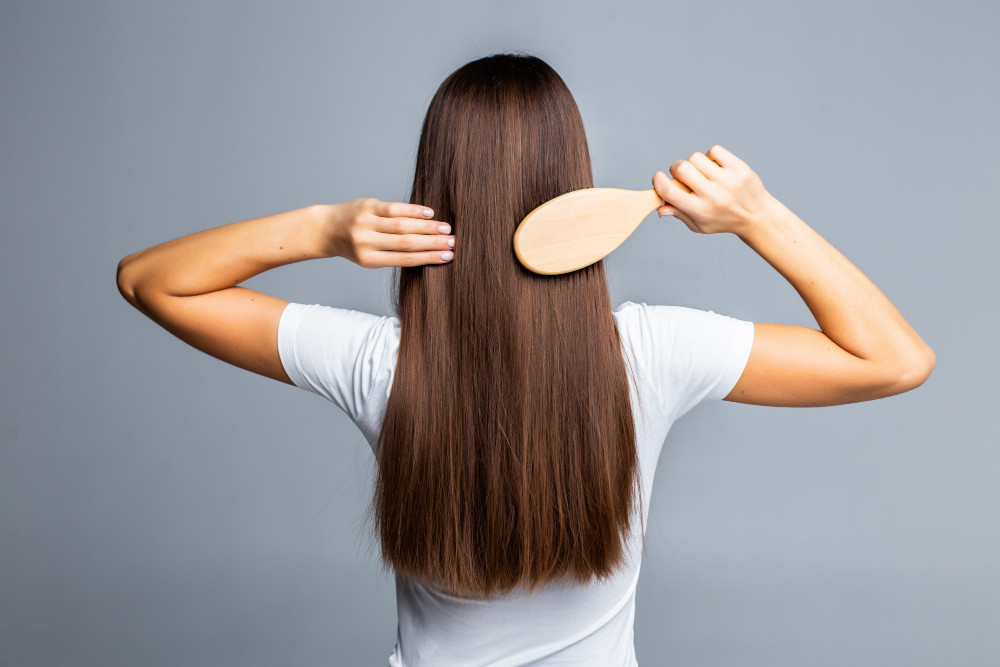Collagen is commonly found in many facial skin care products. However, collagen has several hair-related benefits. What are the benefits of collagen for skin and hair, and what natural sources of collagen can be consumed on a daily basis? Check out the following review.
Benefits of collagen for hair and skin
Collagen is the most abundant structural protein in the human body. Collagen is found in connective tissue, skin, tendons, bones, and cartilage and serves as structural support for tissues while also playing an important role in cellular processes such as cell repair, immune system response, cellular communication, and cell migration.
The body naturally produces collagen on a regular basis, but this ability declines as we age. Collagen deficiency is characterized by sagging skin, fine lines, and a variety of other health issues.
Read more: Benefits and Side Effects of Collagen Drinks
Numerous studies have shown that collagen has several benefits for hair and skin, including:
Reduces wrinkles and fine lines
Collagen is well-known for its ability to improve skin health. A study of 1125 participants aged 20 to 70 found that collagen consumption can improve skin hydration, elasticity, and conceal wrinkles.
To achieve the best results, collagen consumption should be combined with the use of sunscreen. Despite the study's positive findings, researchers believe more extensive research is needed to determine the use and side effects of collagen consumption in treating skin problems.
Reduces hair loss
According to Healthline, collagen intake can help maintain healthy hair by reducing hair loss via the following mechanisms:
- Collagen contains amino acids that help form keratin, which is required for healthy hair growth
- Collagen acts as an antioxidant and helps fight free radical damage, which can also impact hair follicle damage
- Collagen maintains the elasticity of the dermis layer, which may thin with age
Additional advantages of collagen for hair health include:
- It helps slow the process of graying hair
- It hydrates the scalp and hair
Read more: How To Increase Collagen Production In The Skin
Natural collagen sources
Collagen can be obtained from supplements or natural food ingredients like:
Bone broth
Animal bones are rich in collagen. During the cooking process, the collagen in the bones and connective tissues breaks down into gelatin through a slow boiling process, which is easily absorbed by the body. Aside from collagen, bone broth contains amino acids and essential minerals, which are beneficial for additional nutrition.
Fish and its skin
Fish and its skin are good sources of collagen and are known to have high bioavailability. This means that collagen from fish and their skin is more easily absorbed by the body and used more efficiently than collagen from other sources.
Seafood collagen is primarily composed of type 1 collagen, which promotes the health and elasticity of the skin, bones, tendons, and other tissues.
Chicken meat
Some chicken parts, such as the thighs, contain high levels of collagen. Aside from being tender and soft, chicken meat has a delicious flavor. You can consume chicken meat along with the skin, especially from the thigh or breast.
Egg white
Egg whites do not contain specific types of collagen, but they are high in important nutrients like proline, which promotes collagen production in the body. You can eat egg whites by boiling or pouring them into dishes.
Green vegetables
Green vegetables, such as broccoli, spinach, and kale, are high in vitamin C and minerals with antioxidant properties. The chlorophyll content contains antioxidants, which contribute to the increase of precursors for the skin.
You can get collagen from natural ingredients or supplements. Consult a doctor for recommendations on collagen supplements that are more effective in terms of absorption in the body.
If you need medical advice or consultation, you can either visit a doctor or make use of the consultation features that are available in the Ai Care application by downloading the Ai Care application from the App Store or Play Store.
Looking for more information about nutrition, food, and other diet tips? Click here!
- Sean Edbert Lim, MBBS
Streit, L. (2019). 5 Evidence-Based Ways Collagen May Improve Your Hair. Available from: https://www.healthline.com/nutrition/collagen-for-hair
Cleveland Clinic. Collagen Won’t Hurt Hair Growth, But It Probably Won’t Help Either. Available from: https://health.clevelandclinic.org/collagen-for-hair-growth
Duggan, C. (2023). Collagen Peptides for Hair: Benefits and How to Use. Available from: https://www.byrdie.com/collagen-peptides-for-hair-5211316
Migala, J. (2023), 8 Potential Health Benefits of Collagen — and 1 Thing It Can’t Do. Available from: https://www.everydayhealth.com/skin-beauty/potential-health-benefits-of-collagen-and-thing-it-cant-do/
Begum, J. (2023). Health Benefits of Collagen. Available from: https://www.webmd.com/diet/collagen-health-benefits
Walle, G.; Elliott, B. (2023). Top 6 Benefits of Taking Collagen Supplements. Available from: https://www.healthline.com/nutrition/collagen-benefits#
Horton, B. (2023). 10 Collagen-Rich Foods to Add to Your Diet. Available from: https://www.eatingwell.com/article/7896640/best-foods-to-eat-for-a-collagen-boost/











